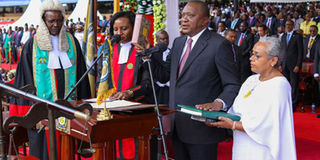Uhuru sailing in smooth political waters a year after swearing-in

President Uhuru Kenyatta takes the oath of office for his second term at the Moi International Sports Centre Kasarani on November 28, 2017. PHOTO | FILE | NATION MEDIA GROUP
What you need to know:
- Fast forward to today and the mouths spitting political venom have suddenly gone quiet, and the streets are calm and free of political protests.
- United at last year’s August polls, the opposition has since collapsed, with Mr Odinga and Mr Musyoka opting to work with Mr Kenyatta.
- Mr Musalia Mudavadi describes the current political tranquility as “a false calm, hiding in a devastating storm.”
When President Uhuru Kenyatta took oath of office as Kenya’s President for a second term, exactly one year ago, he was cheered on largely by Jubilee party supporters in branded T-shirts, caps, wrappers and umbrellas. Except for the invited guests in the VIP stand, this was clearly a partisan audience.
And Deputy President William Ruto could not help savouring Jubilee’s poll victory, with a chant “si uchawi, ni maombi (we did not win by magic but prayer)”, before leading the jubilant crowd waving party flags and the President’s portrait into singing a popular gospel chorus, “hakuna Mungu kama wewe (there is no Lord like you)”.
Sixty days later, a section of the Kenyan population that did not consider itself part of the events of November 28, 2017 at Nairobi’s Kasarani stadium gathered at Uhuru Park for a mock swearing-in of opposition leader Raila Odinga as “the people’s president”.
ANNOUNCE WINNER
At the event, Mr Odinga reiterated, “wakipiga, tunapiga, wakihesabu tunahesabu, wakijumlisha tunajumlisha, wakitangaza tunatangaza, wakiapisha tunaapisha (If they vote we also cast our vote, if they count we also count, if they tally the results we do likewise, if they announce a winner we do the same, and if they swear in their candidate, we also swear in ours)” — thereby hardening the political stances in the country.
The hard positions led to violent street protests and loss of innocent lives.
Fast forward to today — November 28, 2018 — and the mouths spitting political venom have suddenly gone quiet, and the streets are calm and free of political protests.
The political landscape has changed dramatically in just one year with Mr Odinga and Mr Kalonzo Musyoka, who were flagbearers of the opposition ticket, “working with” President Kenyatta’s government.
SECURED APPOINTMENTS
The two have similarly secured appointments as African Union’s High Representative for Infrastructure Development and envoy to South Sudan’s peace process, respectively.
United at last year’s August polls, the opposition has since collapsed, with Mr Odinga and Mr Musyoka opting to work with Mr Kenyatta and Ford-Kenya party leader Moses Wetang’ula leaning towards Mr Ruto. The developments have arguably left Amani National Congress leader Musalia Mudavadi as the sole face of the opposition.
Now Mr Mudavadi, the founder of National Super Alliance, describes the current political tranquility as “a false calm, hiding in a devastating storm” — a view shared by a section of opposition politicians who fear the opposition may be playing into Jubilee’s net.
“This is not about weakening the opposition,” says Jubilee party vice-chairman David Murathe. The one-time MP for Gatanga explains that Mr Odinga’s decision to work with the President “is a most welcome gesture, which has resulted in political tranquility in the country and helped the President to focus on realising his Big Four development agenda and concentrate on securing his legacy.”
UNITY
“Otherwise, the handshake is not a ploy to finish anybody politically, including Mr Odinga or the DP. At the moment we are focusing on uniting the country because we cannot be in a campaign mode forever. Soon every Kenyan will be at liberty to put forward their agenda for mwananchi,” Mr Murathe told the Nation.
National Assembly Minority Leader and ODM chairman John Mbadi similarly dismissed talk of being caged by the government. According to Mr Mbadi, the new arrangement has only changed the opposition’s approach to pushing the people’s agenda by lobbying in Parliament and the Executive, as opposed to “taking to the streets”.
Nonetheless, things have not been rosy within the opposition. Vocal Siaya Senator James Orengo has since replaced Mr Wetang’ula as Senate Minority Leader in a move that saw the Bungoma senator famously threaten “that such a divorce would be noisy and messy”. Other leading opposition politicians, including Wetang’ula’s deputy at Ford-Kenya, Dr Boni Khalwale, have since changed allegiance.
DEVELOPMENT
A sworn Ruto critic, who served as a member of Nasa’s steering committee during the presidential campaigns, the self-confessed bullfighter has stopped charging at Ruto and is instead busy spreading the DP’s political gospel in western Kenya.
Noting that he has spent decades on podiums every election year campaigning on the platform of integrity and development, the former Kakamega senator regrets that issues do not fly in Kenya: “If issues mattered, we would have succeeded to vote out Ruto and (President) Kenyatta in 2013 when they were facing serious charges at The Hague, or last year owing to corruption in the Jubilee administration. What matters, however, is tribalism and a good coalition of tribes is what one needs to State House.”
HANDSHAKE
In Parliament, Malindi MP Aisha Jumwa is the epitome of the radical shifts. The vocal ODM-allied MP has since jumped ship. From her typical scornful dirge of “lala salama uendako Jubilee (fare thee well Jubilee)” which she belted out at campaign rallies last year, Ms Jumwa is now dancing to the DP’s tune.
In defence, she argues that by reaching out to President Kenyatta in the famous “handshake”, her party leader opened avenues for members to extend handshakes limitlessly.
“Nataka niwaambie dau hili ambao nimelipanda … naitwa sishuki (I want to confirm that I am not disembarking from this vessel I have boarded)”, she affirmed on July 7 at a function in Kwale county attended by the DP.





